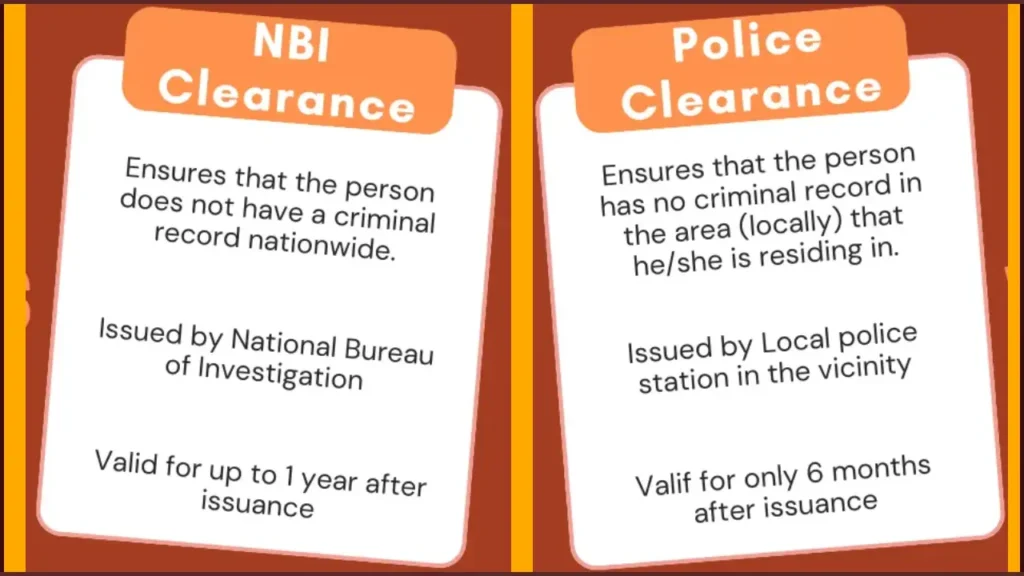Police Clearance vs NBI Clearance: Understanding the Difference in Philippines

In the Philippines, clearances are often required for jobs, permits, and other official transactions. Many people get confused between Police Clearance vs NBI Clearance, unsure of which one to secure. Both certify that you have no pending cases, but they differ in coverage, validity, and where they are accepted.
Knowing the differences helps you avoid delays and unnecessary expenses. The clearance you need depends on its purpose local employment, government requirements, or international use. Let’s explore each one so you’ll know exactly which to get.
What is Police Clearance?
Police Clearance is an official document issued by the local police station in your city or municipality. It certifies that you have no pending criminal records within that specific area. This clearance is mostly used for local purposes and is easier to obtain compared to other clearances.
When it is commonly required
Police Clearance is often needed for simple local transactions and smaller-scale requirements.
- Applying for local employment within the city or municipality
- Processing barangay or city government permits and requirements
- Starting or registering a small business in the community
- Enrolling in certain schools, training programs, or local institutions
- Completing community-related or barangay-level transactions
What is NBI Clearance?
NBI Clearance is issued by the National Bureau of Investigation and covers a nationwide criminal background check. Unlike Police Clearance, it is recognized across the Philippines and even for international purposes. It is often required for jobs, travel, and government-related applications.
Importance for nationwide use
NBI Clearance is considered more comprehensive and widely accepted compared to Police Clearance.
- Required when applying for passports and international visa processing
- Necessary for both government and private sector employment nationwide
- Used in securing larger business licenses, permits, or corporate requirements
- Essential for overseas employment and working abroad applications
- Accepted for various legal, financial, and other official documentation
Visit More Blogs: NBI Clearance Online Application
Step-by-Step Guide to Police Clearance vs NBI Clearance
Applying for either Police Clearance or NBI Clearance is a straightforward process, but each has its own requirements and procedures. Knowing the steps in advance helps you save time and avoid unnecessary delays.
Getting Police Clearance
Police Clearance is processed directly at your local police station and usually takes less than a day to complete.
- Prepare at least two valid government-issued IDs along with a barangay clearance from your local area.
- Visit the nearest city or municipal police station that processes clearance applications.
- Fill out the official application form with your personal information and purpose.
- Pay the corresponding processing fee at the cashier or designated payment counter.
- Undergo fingerprinting and digital photo capture at the station.
- Wait for verification and claim your Police Clearance once processing is finalized, often within the same day.

Getting NBI Clearance
NBI Clearance requires online registration and scheduling before visiting an NBI branch for final processing.
- Go to the official NBI Clearance website and create an account or log in if you already have one.
- Fill out the online application form carefully with accurate personal details and intended purpose.
- Choose a convenient schedule and the preferred NBI branch where you want to process your application.
- Pay the clearance fee using online banking, mobile wallets, or authorized payment centers.
- Visit the selected NBI branch on your scheduled appointment date and bring valid IDs.
- Complete the biometrics procedure, including fingerprint scanning and photo capture, for verification.
- Claim your clearance once released; if no “hit” is found, it is usually issued the same day.
Visit More Blogs: NBI Clearance Renewal Online
Key Differences Between Police Clearance and NBI Clearance
Although both documents certify a clean record, they differ in how and where they are recognized. Below is a clear comparison to help you understand the main distinctions.
Differences Police Vs NBI Clearance
| Category | Police Clearance | NBI Clearance |
|---|---|---|
| Coverage and Scope | Limited to records within the city or municipality | Covers criminal records nationwide |
| Issuing Authority | Local Police Station | National Bureau of Investigation (NBI) |
| Validity Period | Usually valid for 6 months | Valid for 1 year |
| Application Process | Applied for at local police stations, requires barangay clearance and valid IDs | Requires online registration, appointment, and personal appearance at NBI branches |
| Cost and Fees | Around ₱100–₱150 depending on locality | Around ₱130–₱170 depending on purpose |
When Do You Need Police Clearance?
Police Clearance is generally required for local-level transactions and community-related needs. It works well for simple processes that do not need nationwide verification. Most often, it’s the first clearance requested by barangays, schools, and small businesses.
Advantages of Police Clearance
Police Clearance is quick to obtain and highly accessible since it is issued at local police stations. It is especially helpful for immediate, small-scale requirements.
- Faster processing time: Applications are usually completed within the same day.
- Convenient location: Available at the nearest city or municipal police station.
- Lower cost: Generally more affordable compared to NBI Clearance.
- Good for local needs: Perfect for barangay transactions and local employment.
- Easier requirements: Only requires valid IDs and a barangay clearance.
When Do You Need NBI Clearance?
NBI Clearance is required when your purpose extends beyond local requirements. It’s commonly needed for government jobs, international travel, and employment with large companies. Because it covers nationwide records, it is more trusted for formal and legal transactions.
Advantages of NBI Clearance
NBI Clearance is more versatile and widely accepted both within the Philippines and abroad. It is often the go-to document for important official processes.
- Nationwide recognition: Accepted by all government agencies and private companies.
- Required for passports and visas: Essential for international travel and work abroad.
- Covers nationwide records: Provides a complete background check across the Philippines.
- Higher credibility: Seen as more reliable for employment and legal transactions.
- Multi-purpose use: Useful for jobs, business permits, licensing, and official IDs.
Which is More Accepted?
Between the two, NBI Clearance is generally more accepted because it covers nationwide records. Most employers, government offices, and even foreign agencies prefer it for its broader scope.
Police Clearance, on the other hand, is useful but limited to local needs. It is often accepted only for barangay-level or city-level requirements and not for national or international purposes.
Visit More Blogs: Renew NBI Appointment Online
Tips for Hassle-Free Application
A smooth application process starts with being prepared and knowing what to expect. Here are some practical tips to make things easier.
- Prepare your documents early: Gather valid IDs, barangay clearance, and other requirements before heading out.
- Apply during off-peak hours: Visit early in the morning or mid-week to avoid long lines.
- Double-check personal details: Make sure your name, birthdate, and other information are accurate.
- Keep payment receipts safe: You’ll need them as proof during the claiming process.
- Schedule online for NBI: Booking your appointment online saves you from unnecessary waiting.
Final Thoughts
Understanding the difference between Police Clearance and NBI Clearance saves you from confusion and wasted effort. Each document has its own purpose Police Clearance for local needs and NBI Clearance for nationwide or international use.
Choosing the right clearance depends on where you’ll use it and the requirements of the institution asking for it. By knowing their differences, you can prepare better and avoid unnecessary delays in your applications.




